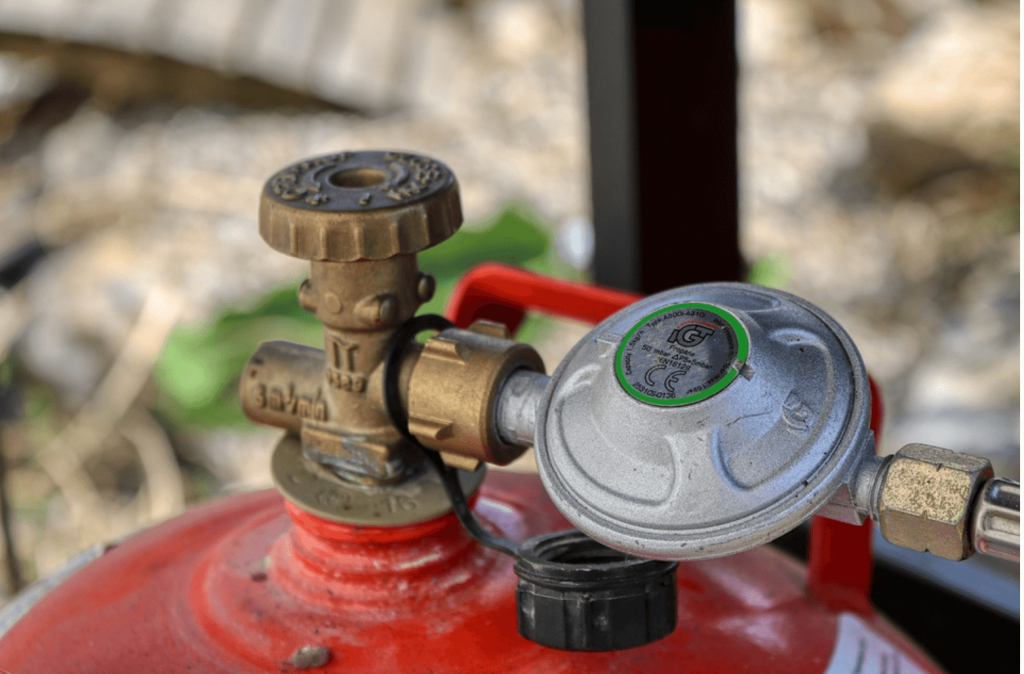
Here’s our full analysis on whether propane heaters are safe in tents.
Camping in fall and winter is fall fun and games until you’re chilled to the bone, shivering, and afraid to stand up in case your legs freeze over.
I’ve been there, so I went hunting for a tent-safe solution that can add the heat back into any camping trip. Enter: propane heaters, the camping tool that saved my life and saved my toes from frostbite.
Propane heaters are safe in tents, but you need to follow the directions and safety guidelines in your heater’s manual. Make sure you purchase a propane heater intended for indoor use and keep a carbon monoxide detector nearby.
Be sure to research your chosen heater rigorously when buying a propane heater for camping, and for best results, look for a heater made specifically for tents.
What Is a Propane Heater?
You might know a thing or two about propane if you own a gas barbecue or another gas-powered appliance: propane is a natural gas that’s used to fuel a variety of appliances, including heaters.
A propane heater is a propane-powered device designed to warm the air to a temperature higher than your body. These dependable devices are powered using a gas canister and no other power source.
Propane heaters are common for outdoor use, for example, on patios. They’re usually most suitable for use in open-air conditions, as they produce harmful emissions that, when left unchecked, can cause serious illness or even fatalities.
Despite this, there are propane heaters designed for use in enclosed spaces, and they’re deemed as safe to sell and use. Propane heaters are only dangerous when you don’t follow the appropriate safety precautions.
Can Propane Heaters Cause Carbon Monoxide Poisoning?
Propane heaters produce a minimal amount of carbon monoxide. In fact, they produce more water vapor and CO2. They can only cause carbon monoxide poisoning if used while faulty, used in unventilated spaces, or used without taking safety precautions.
The amount of carbon monoxide that propane heaters produce varies, but it isn’t enough to cause serious damage if you have a 24:1 balance of air to propane ratio. Often, the emissions are so low that carbon monoxide detectors can’t detect them.
Faulty propane heaters produce the most carbon monoxide, so you generally don’t have to worry when your heater is functioning as it should.
Malfunctioning propane heaters, like heaters with clogged burners, are far more likely to cause harm than a heater that’s functioning well.
If you’d like to know more about carbon monoxide poisoning from propane heaters, you can read about it in this article created by experts on natural gas/propane (LPG).
What Makes a Propane Heater Safe in Tents?
Anyone purchasing a propane heater should look for the safety precautions that many modern manufacturers implement.
Indoor propane heaters designed for tent use are particularly adept at adding these precautions. Here are three things that you should look for in your heater:
Carbon Monoxide Detector
If your heater has this feature, it turns off if it detects too much carbon monoxide in the air. Your heater should have no detectable emissions. So, if there is carbon monoxide around, then your heater will shut down to ensure there’ll be no more, keeping you safe.
Overheating Detector
With this feature, the heater switches off when it reaches a certain temperature to avoid overheating. The heater will have a thermometer built into it, and it shuts off when the unit reaches a temperature that the manufacturers deem dangerous.
This drastically decreases the likelihood of your heater getting damaged or causing a fire.
Fall Detector
A heater with a fall detector ensures it shuts down if it falls over. Propane heaters falling forward will project their heat right onto the floor from up close, which is a fire hazard. Falling in any other direction stops air from circulating correctly, and that can damage the heater and your tent.
A heater with a fall detector is the best way to go if you want to be as safe as possible.
Tent Heater Deaths: How Common Are They?
From 2006–2019, approximately 40 million Americans went camping every year. This study from 1999 shows that from 1979–1988, approximately 878–1512 people died from unintentional carbon monoxide poisoning. This is a strikingly low ratio of deaths to campers.
Researching tent heater deaths brings up a slew of articles from the last two decades, and that can seem alarming at first. However, you need to look at the bigger picture outlined above when it comes to camping vs. tent heater deaths.
Yes, there’s a sizeable gap between 1999 and 2019, but the 1999 study is the most recent documented study on the subject that’s easily accessible to the public. This likely indicates that tent heater deaths aren’t common enough to warrant frequent studies on the subject.
It’s also likely that, if studied again now, that the number of deaths from tent heaters will have dropped significantly with the rise of safety features implemented into modern heaters.
Propane Tent Heater Safety Tips
There are ways to make things a little safer for you and your fellow campers while camping with a heater. These precautions apply to all heater types. Employing these tips will ensure that you have no issues on your next cold-weather camping trip.
Keep Flammable Objects Far Away
Keep your clothes, sleeping bag, camping gear, and the tent’s fabric as far away from your heater as possible. Ideally, you’ll place the heater in the middle of the tent and keep your gear and yourself along the walls.
You could also place your heater in one corner of the tent that you can easily avoid, but keep in mind, it can’t be too close to the walls. Placing the heater a foot or two from the walls is best.
Ensure It’s Stable
Most modern heaters will switch off if they fall over, but it’s still best to avoid the situation entirely. Try to place your heater on stable, even ground, and make sure there’s no debris under your tent.
Never Leave Your Heater Unsupervised
Never exit your tent when your heater is running.
Someone needs to be in your tent at all times when you’re using a heater of any type. It’s safe to sleep with your heater running, but remember, don’t sleep too close to the heater in case you move and knock it over while sleeping.
Use a Carbon Monoxide Detector
Using a carbon monoxide detector throughout your trip will ensure you’re staying safe. Your detector can alert you of increasing carbon monoxide in the air, and you’ll know it’s time to turn off your heater and get out of the tent for a while.
It’s best if you have a detector that you can keep next to the tent and leave on full-time.
This video will show you an extensive carbon monoxide test using a carbon monoxide detector in a tent. Not only does it show you that using a propane heater is safe, but it shows you how you can monitor your own heater’s emissions, too.
Here’s the gear used in the video, if you’re interested:
Get Your Heater Checked Out Regularly
You should bring your heater to an expert to be checked out before every camping trip. That way, you can be sure that it’s functioning properly.
You don’t want to arrive at your campsite and realize your heater isn’t working, and you definitely don’t want to risk camping with a faulty heater. That could increase carbon monoxide emissions to a dangerous level.
Stay Well Ventilated
Always operate your heater in a well-ventilated area. If your tent has vents, ensure they’re open while the heater is on.
This might sound counterproductive to your heating needs, but don’t worry. Your heater will keep you warm. The vents will make sure air circulates through your tent, but they won’t decrease the temperature in the air if the heater is doing its job sufficiently.
It’s best to use propane heaters in double-walled mesh tents, as it’s easier for air to circulate that way. It’s safe to use them in single-walled tents too.
If you’re using your propane heater in a canvas tent, then ensure there’s a stove jack to let the air circulate. However, using a tent stove in canvas tents is wiser than using a propane heater.
This video on reducing condensation in your tent has some great tips for keeping your tent well-ventilated:
Of course, his tip on avoiding heat sources doesn’t apply in your case.
Other Heaters That Are Safe for Tents
Propane heaters remain safe for use in tents, but if you’d rather look for another heating option, then there are two types of heaters that you may wish to consider.
Battery-Powered
Battery-powered heaters are fantastic if you want to avoid gas and you have no or limited access to electricity. I like battery-powered heaters as they’re convenient and portable, and there are no ongoing costs associated with them. You buy the battery once, and that’s it.
You won’t be using the kind of batteries you find in your TV remote, though. Battery-powered heaters use big, beefy batteries. A 12v battery supply is the most common.
You’ll need to purchase a 12v heater and a portable power station. Once your power station is fully charged up, then it can power your heater for days.
The Goal Zero Yeti 400 is an excellent portable power station that can fuel up to 7 devices at once.
Electric Heaters
Electric heaters are the most common household heater you’ll find, and they’re arguably the easiest to deal with, even in tents. They range from big, portable electric fireplaces to small heating fans that you can place in the corner of your tent.
Electric heaters are safe if you supervise them properly and place them a few inches away from the tent walls. They need room for air to circulate all around them so they don’t overheat.
This type of heater is great for using at a powered campsite. Bring a sturdy outdoor extension cable and plug it into the available outlet on your campsite.
If your site is unpowered, then you can plug it into your car instead. You’ll need a power inverter to power the heater via your car.
Make sure your tent is fully waterproof and doesn’t leak if you wish to use an electric heater. We all know water and electricity don’t mix. Using a tent with an e-port (a small opening in the tent to pass a cable through) is wise if you’re using an electric heater.
Check out this article if you want to learn about tent waterproofing.
Getting Things Wrapped Up
Propane heaters are perfectly safe for use in tents, but if you’re worried about carbon monoxide, then electric and battery-powered heaters are excellent, too.
If you get your propane heater checked out regularly to ensure there’s nothing wrong with it, then you’ll have no problems. Follow the safety tips as outlined above, and you’ll stay safe and cozy for many winters to come.














